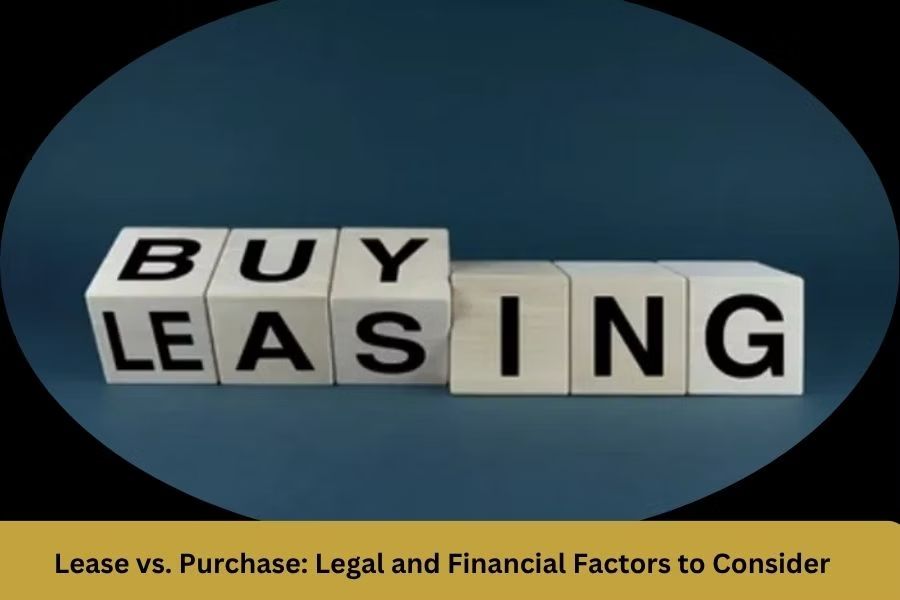When it comes to acquiring commercial property, one of the biggest decisions business owners face is whether to lease or purchase. Both options offer distinct advantages and challenges, and the right choice depends on your business goals, financial situation, and risk tolerance.
At The Real Estate Law Firm, we help clients navigate these crucial decisions with clarity, ensuring both legal compliance and financial viability. In this article, we’ll break down the core legal and financial factors to consider when deciding whether to lease or purchase real estate.
Explore commercial real estate solutions designed for your goals.
Understanding the Basics: Lease vs. Purchase
Leasing involves paying a monthly fee to use a property for a set period, while purchasing means buying the property outright or through financing, granting full ownership.
Leasing is often attractive for startups or businesses needing flexibility, while purchasing can be a smart investment for companies seeking long-term stability and asset growth.
Financial Considerations
-
Upfront Costs
Lease: Requires a security deposit and initial rent payment. Generally less expensive upfront.
Purchase: Requires a down payment (typically 10–30% of the property’s value), closing costs, appraisal fees, and other purchase-related expenses.
The Real Estate Law Firm advises that if capital preservation is a priority, leasing might be the safer short-term choice.
-
Monthly Expenses
Lease: Monthly rent, which may increase over time depending on the lease terms.
Purchase: Mortgage payments, property taxes, insurance, and maintenance costs.
Purchasing often has higher recurring costs, but over time, the buyer builds equity. Rent, on the other hand, offers no return on investment.
-
Tax Implications
Lease: Rent payments are fully tax-deductible as a business expense.
Purchase: Depreciation, mortgage interest, and certain operating expenses may be deductible.
The Real Estate Law Firm can assist with understanding how each option impacts your specific tax strategy.
Discuss your financial goals with our real estate team.
-
Appreciation and ROI
Purchasing allows for potential property appreciation and equity build-up, offering a long-term financial return. Leasing provides no such gain but offers freedom from market fluctuations.
Legal Considerations
-
Lease Agreement Complexity
Lease contracts are often more intricate than they seem. They may include clauses around:
-
Rent escalation
-
Maintenance responsibilities
-
Renewal options
-
Exit penalties
It’s vital to have lease agreements reviewed by professionals. The Real Estate Law Firm routinely evaluates commercial leases to ensure your business isn’t trapped in unfavourable terms.
-
Ownership Rights
With purchase, you have full control over the property — from renovations to subleasing, within zoning laws. Leasing, however, often limits such freedoms, and modifications typically require landlord approval.
-
Liability and Risk Exposure
Owners face legal responsibilities such as liability for property-related injuries, ADA compliance, and environmental regulations. Tenants may avoid some liabilities but still carry risk under the lease.
The Real Estate Law Firm helps you understand liability differences and ensure your interests are protected.
-
Exit Strategy and Flexibility
Leasing: Offers more flexibility with shorter commitments and easier relocation.
Purchasing: Exiting may involve selling or leasing the property, which can take time and comes with market risk.
Situational Analysis: When Leasing Makes Sense
-
Your business is growing or moving frequently
-
You need to conserve capital
-
The local market has high purchase prices
-
The property type isn’t central to your business function (e.g., temporary warehouse)
Leasing provides strategic agility and reduced responsibility, ideal for businesses in flux.
Situational Analysis: When Purchasing is Wiser
-
You plan to stay long-term in one location
-
You want to build equity
-
You require full control over the premises
-
You see the property as an investment asset
Ownership is beneficial for business stability and wealth accumulation.
The Real Estate Law Firm often works with established businesses seeking to invest in real estate as part of their broader growth strategy.
Long-Term Vision: How Your Choice Affects Business Trajectory
Leasing may feel less risky, but over time, those payments add up without adding value. Owning property gives you an asset that may appreciate and eventually contribute to your net worth.
Ask yourself:
-
What’s your 5- to 10-year plan?
-
Will location stability impact your brand?
-
Do you have the capacity to maintain a property?
Whether you lease or buy, each option plays a role in your operational identity and financial future.
Final Thoughts: Get Legal Clarity Before You Sign
The decision between leasing and purchasing commercial property is more than a numbers game — it’s a legal commitment. You need to ensure that your rights, finances, and future business goals are all aligned with your real estate choice.
The Real Estate Law Firm is here to guide you through the contract review process, zoning compliance, property title checks, and more. Whether you’re eyeing a lease or ready to make a purchase, our legal insight helps protect what you’re building.
Book a consultation to plan your property investment.
FAQs: Lease vs. Purchase – What You Need to Know
-
What’s the main advantage of leasing over purchasing?
Leasing offers lower upfront costs and greater flexibility for businesses that expect change or growth. -
Is owning commercial property a good investment?
Yes, owning allows you to build equity and benefit from property appreciation over time. -
Can lease terms be negotiated?
Absolutely. Rent, renewal options, maintenance responsibilities, and more can often be negotiated. -
What taxes can I deduct if I lease vs. own?
Leasing allows for full rent deduction. Ownership allows deductions on mortgage interest, depreciation, and certain operating expenses. -
What legal risks are there with leasing?
Hidden clauses in leases, liability issues, and sudden rent hikes can be problematic without proper legal review. -
Can I sublease a leased property?
That depends on your lease agreement. Some prohibit it outright or require landlord approval. -
What happens if I want to break a lease early?
You may face penalties or legal consequences. Always check for early termination clauses. -
What if the purchased property has title issues?
Title issues can delay or invalidate a transaction. The Real Estate Law Firm performs comprehensive title checks before you buy. -
Does purchasing limit my business’s mobility?
Yes, owning property ties you to one location unless you lease or sell it later. -
Should I involve a real estate attorney in my decision?
Yes. Whether leasing or buying, an attorney ensures your contract is legally sound and aligned with your business goals.




